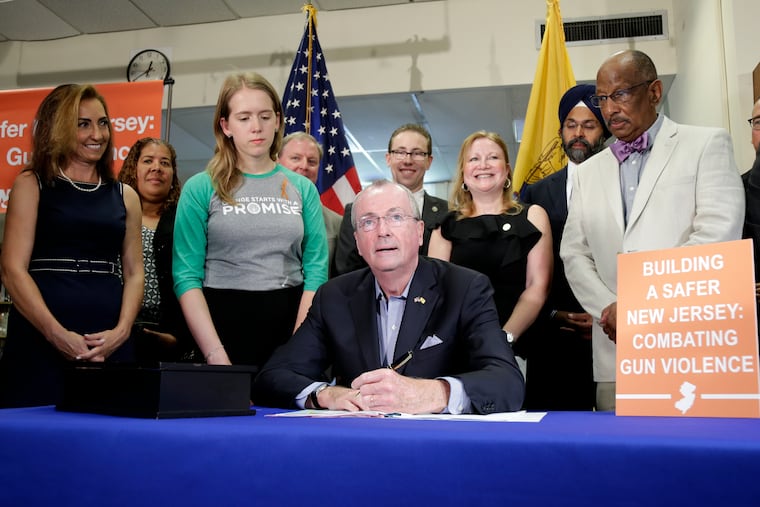The Supreme Court’s gun ruling impacts New Jersey’s concealed-carry laws. Here’s what to know.
‘All other requirements for obtaining a carry permit still apply,’ said the state’s acting attorney general.

The U.S. Supreme Court on Thursday struck down a New York law requiring people to show they had “proper cause” to carry handguns in public for self-defense.
The 6-3 ruling could have implications for several states that have similar restrictions on the books, including the Garden State, which has a century-old requirement that people have a written certification of “justifiable need” when applying for a concealed carry permit. Pennsylvania does not have a similar requirement.
In a statement Thursday, New Jersey Gov. Phil Murphy said his office is reviewing the opinion to ensure the state’s gun safety laws remain “as strong as possible while remaining consistent with this tragic ruling.”
“Based on a deeply flawed constitutional methodology, a right-wing majority on the United States Supreme Court has just said that states can no longer decide for ourselves how best to limit the proliferation of firearms in the public sphere,” wrote Murphy.
The court’s ruling
Thursday marked the first time in more than a decade that a court decision addressed Second Amendment rights. In 2008′s District of Columbia v. Heller and 2010′s McDonald v. Chicago the court found the Second and 14th Amendments give citizens the constitutional right to keep handguns in their homes for self-defense.
“We too agree, and now hold, consistent with Heller and McDonald, that the Second and Fourteenth Amendments protect an individual’s right to carry a handgun for self-defense outside the home,” wrote Justice Clarence Thomas in the majority opinion.
» READ MORE: Supreme Court expands gun rights, with nation divided
What does New Jersey require for a concealed carry permit?
The Garden State has some of the strictest gun safety laws in the country. To obtain a concealed handgun permit, applicants need to be 21 or older and show they face specific threats to their life that “cannot be avoided by means other than by issuance of a permit to carry.”
Applicants also need to collect three endorsements from people who can speak to their “character and behavior” and a certification that shows the applicant has a “thorough familiarity” with handguns.
Gun-advocate groups have long argued the “justified need” requirement makes it almost impossible for people to secure these permits.
» READ MORE: How gun laws in New Jersey work: Licenses, permits, open carry, concealed carry
How does the ruling affect New Jersey’s application process?
Concealed carry permits are processed by local law enforcement and New Jersey State Police. It’s not clear how they’re to handle applications submitted from this point forward.
Acting Attorney General Matthew J. Platkin told the Associated Press the court’s decision “effectively struck down” the state’s “justified need” requirement, with changes taking place “imminently.”
Still, Platkin said nothing else will change in the permit application process.
“To be clear: Carrying a handgun without a permit is still illegal in this state, and all other requirements for obtaining a carry permit still apply,” he said.
What are people saying?
Predictably, gun-rights groups welcomed the decision. In recent years, New Jersey’s “justified need” provision had already been the target of lawsuits filed by groups like the New Jersey Second Amendment Society.
“We’re ecstatic,” said the group’s president, Alejandro Roubian. “The United States Supreme Court has upheld what we’ve always been saying and we’re very thankful that people that want to protect and defend themselves have the ability to do so outside of their homes in New Jersey.”
Proponents of stronger gun safety measures were equally forceful in denouncing the opinion.
“We have seen time and time again that more guns doesn’t equal more safety. If that were the case there would not be this plague of gun violence holding the United States hostage,” said Camden County Commissioner Louis Cappelli Jr.
National gun safety organizations including Giffords Law Center, Everytown for Gun Safety, Brady Center to Prevent Gun Violence, and March for Our Lives quickly called for the Senate to pass a new package of gun safety legislation as a way to offset an expected increase in guns on the streets as a result of the decision.
Protests are planned in front of federal courthouses across the country Friday at 6 p.m. to protest the decision.
Deputy Attorney General Lisa Monaco, the federal Justice Department’s No. 2 official, condemned the ruling while in Philadelphia for a meeting with local law enforcement officials to address rising rates of violent crime.
”We are deeply disappointed in the ruling from the Supreme Court,” she said. “But what it tells me — and what the resolve in this room is about — is to continue to do everything we can to go after gun violence. … Our resolve is only greater in the face of this ruling and we’ve got to do everything we can.”
» READ MORE: Gun bill on road to passage as Senate overcomes GOP delays
What happens now?
Eric Tirschwell, executive director and chief litigation counsel of Everytown, noted it was just one aspect of New York’s concealed permitting process that was struck down.
“It’s important to underscore we’re not talking about an overnight transformation,” said Tirschwell.
And in New Jersey, it’s possible other safeguards will be added to the concealed carry permit application to replace the “justified need” requirement.
Thurman Barnes, assistant director of New Jersey’s Gun Violence Research Center, said the court left the door open for states to restrict carrying firearms in “sensitive locations.”
“States like New Jersey will likely look to step through that door and move to restrict the carrying of firearms in certain places,” said Barnes.
Murphy already hinted at possible changes.
“Anticipating this decision, my Administration has been closely reviewing options we believe are still available to us regarding who can carry concealed weapons and where they can carry them,” said Murphy.
Staff writer Jeremy Roebuck contributed to this article.